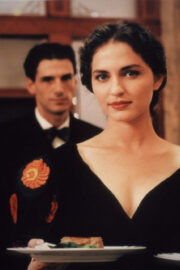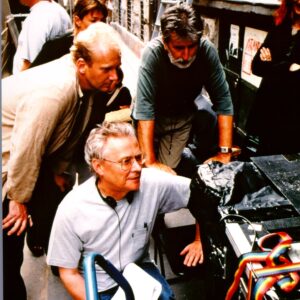Gloomy Sunday - A Story of Love and Fate
Set in Budapest in the 1930s and 1940s, the film is about waitress Ilona Várnai's love triangle with Jewish restaurant owner László Szabó and pianist András Aradi.
Cast
- Laszló Szabó
- Joachim Król
- András Aradi
- Stefano Dionisi
- Hans Eberhard Wieck
- Ben Becker
- Ilona Várnai
- Erica Marozsán
- Obersturmbannführer Eichbaum
- Sebastian Koch

Gloomy Sunday - A Story of Love and Fate
Rolf Schübel
- Fiction
- Production Country / Year
- Germany, Hungary 1999
- Language
- dt. OF ohne UT
- Format
- DCP, Color, 112min
1.85:1, Stereo PCM
- Original Title
- Gloomy Sunday - Ein Lied von Liebe und Tod
Director & Crew

Rolf Schübel
Born in Stuttgart in 1942. Study of sociology and literature. Active as a producer, screenwriter and director.
Filmography
| 1979 | Bier für Lama Kara | Dokumentarfilm | |
| 1982 | Nachruf auf eine Bestie | Dokumentarfilm | |
| 1985 | Der Indianer | Dokumentarfilm Co-Regie |
|
| 1988 | Das Heimweh des Walerjan Wróbel | Spielfilm | |
| 1991 | Todfeinde | Dokumentarfilm Co-Regie |
|
| 1994 | 2 ½ Minuten | Fernsehspiel | |
| 1996 | Woanders scheint nachts die Sonne | Fernsehspiel | |
| 1997 | Ein Lied von Liebe und Tod – Gloomy Sunday | Spielfilm | |
| 1999 | Eine öffentliche Affaire | ||
| 2001 | Kollaps | Fernsehspiel | |
| 2002 | Blueprint | Spielfilm | |
| 2003 | Zeit der Wünsche | Fernsehfilm | |
| 2006 | Tatort: Aus der Traum | Fernsehfilm | |
| 2007 | Tatort: Der Tote vom Straßenrand | Fernsehfilm |
Someone once said: “There are three important things about filmmaking: casting, casting, casting!” I agree wholeheartedly. For weeks and months, the producer and director had kept me in suspense with announcements. A fantastic script was being written, a great production was under construction, and above all, they had a wonderful role for me, one like I had never played before. I was more than excited and naturally skeptical. Drumming is part of the business, as we all know, and often silence follows drumming. Not in this case. The script by Ruth Toma, one of our best screenwriters, was excellent. She had re-worked Nick Barkow’s novel “Lied vom traurigen Sonntag”, which was considered unfilmable, very cleverly and carefully, added the character of Ilona and provided the whole thing with an ingenious dramaturgical bracket. Masterful. A very promising beginning. But above all the problems that still had to be solved, which such an undertaking as “Gloomy Sunday” entails, was of course the cast. Ruth Toma’s screenplay offered four equal leading roles with Ilona, Hans, Laszlo, and Andras, whereby Ilona, of course, had to be the shining center. A difficult task for the caster Tina Böckenhauer. Since I (as Laszlo) was already cast, I was asked to be available as an audition partner for the “casting Ilona.”
And almost at the end of the day, after endless repetitions of the most important Ilona-Laszlo scenes, with the best colleagues Tina Böckenhauer could invite, still nothing was decided, when a small miracle happened. Erika Maroszan, a colleague from Hungary, of whom hardly anyone present had ever heard anything, was still missing. The small door that was embedded in the huge studio door opened hesitantly, and in its frame suddenly stood — Ilona. With an enchanting accent, she said absurdly: “Guten Tag, ich bin Erika,” which, at the same moment, for everyone present, she no longer was. The following audition was purely a matter of form. Never again have I experienced that an actress was so at one with the role she was to play. Everyone, really everyone, was in love with her.
- Writer
- Rolf Schübel
- Ruth Toma
- Director of Photography
- Edward Kłosinski
- Editor
- Ursula Höf
- Music Composer
- Detlef Petersen
- Producer
- Richard Schöps